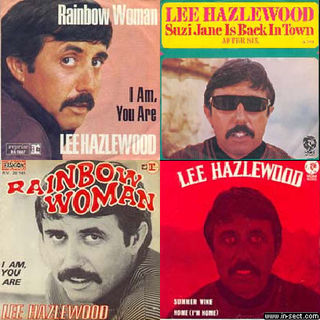I've lost count of how many people have tagged me for this "25 Random Facts About Me" meme. So here goes:

1. When I was a pre-schooler in Oakland CA, I ran away from home, showed up at the door of the Mormon temple, and asked if Shirley could come out to play.
2. I'm a Lee Hazlewood fan.
3. I had a girlfriend who was an editorial assistant at Playgirl. I honed my skills writing sex scenes by writing fake "Letters to the Editor" for $25 each.
4. My favorite BBQ place is It's In the Sauce in Ventura, Ca.
5. When I'm sick, I like to lie in bed and watch old episodes of "Gunsmoke."
6. I wrote my first novel when I was ten. It was about a superspy from the future who was born in an underwater sperm bank. I don't know why it was underwater, or how you made deposits, but I thought it was pretty cool.
7. I love Nacho Cheese Doritos.
8. My favorite James Bond movie is "Goldfinger."
9. I've broken all but one limb…so far.
10. When I was five or six, I used to tell people my name was "Lee Beaudine." I don't know why. 
11. When I was a kid, I once threatened to send my little sister Karen to prison for picking apart my Nerf ball. She was so terrified that she gave me all the money in her piggy bank to buy her freedom. I still feel guilty about that.
12. My middle name is Brian.
13. The ugliest city I have ever been to is El Paso, TX.
14. Until I was about 25, I spent two weeks every summer at Loon Lake, Washington.
15. I love the theme to "It Takes a Thief" but I can't hum it.
16. I had a crush on Linda Carter when I was a kid. She was my Wonder Woman.
17. I think Harry Whittington is one of the great, unappreciated authors of noir.
18. When I was a kid, I used to collect Wacky Packs. I thought the cards were hilarious.
19. One of my all-time favorite books is "Lonesome Dove" by Larry McMurtry.
20. I've seen Roger Moore naked.
21. I like to read Motor Trend and the National Inquirer on airplanes. This embarrasses my wife.
22. I can't spell marriage, similar, or envelope.
23. I wrote two episodes of "The New Adventures of Flipper."
24. I once flagged down a cop on Jefferson Blvd. to alert him that a homeless man was "playing a twisted game of Russian roulette" by running into traffic. The cop actually asked me to repeat that without imitating the ABC announcer's voice.
25. I owned a Chevy Chevette.





